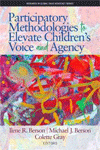
Participatory Methodologies to Elevate Children's Voice and Agency
Edited by:
Ilene R. Berson, University of South Florida
Michael J. Berson, University of South Florida
Colette Gray, Stranmillis University College
A volume in the series: Research in Global Child Advocacy. Editor(s): Ilene R. Berson, University of South Florida. Michael J. Berson, University of South Florida.
Published 2019
This volume of the Research in Global Child Advocacy Series explores participatory methodologies and tools that involve children in research. Perspectives on the role of children have transitioned from viewing children as objects of research, to children as subjects of research, to acknowledgement of children as competent contributors and agents throughout the inquiry process. Researchers continue to explore approaches that honor the capacity of children, drawing on diverse methodologies to elevate children’s voices and actively engage them in the production of knowledge. Nonetheless, despite these developments, questions over the extent to which children can be free of adult filters and influence merits sustained scholarly attention. The book includes chapters that critically examine methodological approaches that empower children in the research process. Contributions include empirical or practitioner pieces that operate from an empowerment paradigm and demonstrate the agenic capacity of children to contribute their perspectives and voices to our understanding of childhood and children’s lives. The text also features conceptual pieces that challenge existing theoretical frameworks, critique research paradigms, and analyze dilemmas or tensions related to ethics, policy and power relations in the research process.
CONTENTS
Preface. Acknowledgments. PART I: CRITICAL PERSPECTIVES ON CHILDREN’S VOICE AND AGENCY: ETHICAL ISSUES AND DILEMMAS. Participatory Research With Children: Critical Reflections, Tiffany Barnikis, Maggie MacNevin, and Rachel Berman. Student Voice Work as an Educative Practice, Susan Groundwater-Smith and Nicole Mockler. Researching the Perspectives of Children With Additional Support Needs During Their Transition to School: Ethical and Methodological Considerations, Edith Jolicoeur, Joanne S. Lehrer, Julie Ruel, Johanne April, and Mathieu Point. The Role of Reflexivity in Performing Collaborative Student Voice Research, Joseph Levitan. Amplifying Youth Voice Through Public Engaged Research, Ross VeLure Roholt and Michael Baizerman. Reflexively Conducting Research With Ethnically Diverse Children With Disabilities1, Amanda Ajodhia. PART II: METHODOLOGICAL APPROACHES TO PARTICIPATORY RESEARCH WITH CHILDREN. Participating in Creating Open Spaces With and for Children: A Kind of Participatory Action Research? Carlo Fabian and Timo Huber. Child Mentors, Virtual Tours, and Adult Protégées: Young Children’s Experiences With Tablet Devices, Colette Gray, Jill Dunn, Pamela Moffett, and Denise Mitchell. Personal Public Service Announcements: Collaborating With Young Women Adopted From Foster Care Using Narradrama and an iPad During Arts-Based Narrative Inquiry, Myriam D. Savage. Lego Serious Play as a Participatory Research Method to Involve Children in Action Research Projects, Heilyn Camacho. Medical Play: From Intervention to Participatory Research, Cara Sisk and Jane Baker. PART III: ISSUES OF REPRESENTATION IN THE ANALYSIS AND INTERPRETATION OF CHILDREN’S PERSPECTIVES. Diffractive Lenses Catching Stories: The Meaning of Belonging Through the Voice of Adolescents, Hanne Vandenbussche, Elisabeth De Schauwer, and Geert Van Hove. An Analytical Tool to Help Researchers Develop Partnerships With Children and Adolescents, Harry Shier. Young Children’s Photography Within Collaborative Research: Implications for Research Relationships, Rosemary D. Richards. Removing the Medical Paradigm—Making Children’s Voices Visible in the Context of Problematic Eating: Participatory Action Research in a Clinical Setting, Colleen McMillan. PART IV: CROSS- NATIONAL PERSPECTIVES ON PARTICIPATORY RESEARCH WITH CHILDREN. Hu M’ani So Ma Me Nti Na Atwe Mmienu Nam (Blow the Dust From My Eyes): Making the Voices of Ghanaian Kindergarteners Visible Through the Use of Video-Cued Ethnography in a Study of Citizenship, Ilene R. Berson, Michael J. Berson, Joyce Esi Bronteng, and Aaron Osafo-Acquah. Sounds From Within: Exploring the Role of Ethnographic Fieldwork to Elevate Children’s Perspectives and Voices in the Study of Children’s Musical Cultures in Ireland, Michelle Finnerty. Adolescent Voices: Empowering Haitian Immigrant Youth Through Privileging Narratives, Lauren Christian Gibson. Co-Creating Space for Voice: Reflections on a Participatory Research Process With War-Affected Youth Living in Canada, Myriam Denov, Natasha Blanchet-Cohen, Alusine Bah, Leontine Uwababyeyi, and Jean Kagame. About the Contributors.
-
Paperback978-1-64113-546-7
Web price: $62.04 (Reg. 72.99)
-
Hardcover978-1-64113-547-4
Web price: $89.24 (Reg. 104.99)
- eBook978-1-64113-548-1

- EDU038000 - EDUCATION: Student Life & Student Affairs
- EDU040000 - EDUCATION: Philosophy & Social Aspects
- EDU034000 - EDUCATION: EDUCATIONAL POLICY & REFORM: General
-
 Advocating for Children and Families in an Emerging Democracy
The Post Soviet Exp. In Lith.
Advocating for Children and Families in an Emerging Democracy
The Post Soviet Exp. In Lith.
-
 Child Advocacy and Early Childhood Education Policies in the Caribbean
Child Advocacy and Early Childhood Education Policies in the Caribbean
-
 Childhood in South Asia
Childhood in South Asia
-
 Cross Cultural Perspectives in Child Advocacy
Cross Cultural Perspectives in Child Advocacy
-
 Digital Technologies and Early Childhood in China
Policy and Practice
Digital Technologies and Early Childhood in China
Policy and Practice
-
 High-Tech Tots
Childhood in a Digital World
High-Tech Tots
Childhood in a Digital World
-
 Overcoming AIDS
Lessons Learned from Uganda
Overcoming AIDS
Lessons Learned from Uganda

